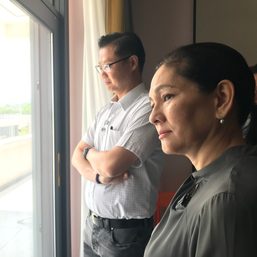SUMMARY
This is AI generated summarization, which may have errors. For context, always refer to the full article.

MANILA, Philippines – The Supreme Court (SC) recently junked a petition which sought a stricter interpretation and enforcement of term limits of lawmakers in Congress.
The 18-page decision promulgated on November 9, 2021, but only uploaded on the SC’s website on Thursday, June 16, dismissed the petition for mandamus filed by seven private individuals, led by lawyer Vladimir Alarique Cabigao.
The petition sought to compel the Commission on Elections (Comelec) to “enforce the term limits of elective officials” in the two chambers of Congress, the Senate and the House of Representatives.
The petitioners wanted the High Court to “declare as unconstitutional the reelection of termed out senators and representatives, and to deny due course to the certificates of candidacy” or COCs of those who fall under this category and ran for reelection in the May 2022 polls.
The group cited Sections 4 and 7, Article VI of the Constitution, which set a six-year term for senators and a three-year term for representatives.
Section 4 also states that no senator “shall serve for more than two consecutive terms,” and Section 7 states similarly that no House representative “shall serve for more than three consecutive terms.”
The petitioners argued that these limits on lawmakers’ term of office mean that once a senator or representative has served two or three maximum consecutive terms, he or she cannot run for and return to the same position ever again, even after a break or hiatus.
The petitioners urged the High Court to stick to a verba legis or “textual reading” of the constitutional provisions. “Allowing termed out officials to seek reelection denies public service opportunity from other equally deserving candidates, who are marginalized by their lack of campaign resources to parallel those of their termed out rivals,” they said.
They offered a list of senators who have served more than two terms, as well as former and current representatives who have served more than three terms.
Among those in the list is current Senate President Vicente Sotto III, who served as senator from 1992 to 2004, then was elected again in 2010 and serving until 2022, for a total of four terms. Also listed as an example was former House speaker Jose de Venecia Jr., who served as representative of the 4th District of Pangasinan from 1987 to 1998, then for a fresh set of three consecutive terms, from 2001 to 2010.
‘Extra-textual reading of Constitution’
However, the SC, in its decision penned by Associate Justice Marvic Leonen, cited the 2002 ruling Socrates vs. Comelec which the petitioners also would want the SC to abandon because it raised similar issues.
The ruling in Socrates vs. Comelec stated that what the Constitution prohibits is the “immediate reelection” of lawmakers after serving the maximum two or three terms in office.
“Clearly, the prohibition and term limit refers to consecutive terms. While the provisions do not textually provide the terms ‘hibernation, hiatus, or rest period,’ the usage of the word ‘consecutive’ indicates that the term limit and prohibition only applies to reelection for an immediately subsequent term,” said the decision.
The High Court then said that the petitioners’ interpretation is “an extra-textual reading of the Constitution.”
The SC agreed with the Comelec’s comment that it is the poll body’s ministerial duty to give due course to COCs. The Comelec also commented that term limits of senators and representatives “are not defects immediately apparent on the face of certificates of candidacy.”
The Comelec by itself cannot deny due course or cancel a certificate if it was filed in due form, added the Court. “The petitioners’ prayer to motu proprio (on its own) deny due course to the certificates of candidates is contrary to the mandate of the respondent.”
What the petitioners should have done, said the SC, is to file a petition with the Comelec to deny due course or to cancel a COC under Section 78 of the Omnibus Election Code.
In addition, the High Court said the petitioners did not have legal standing because none of them “claimed that they ran as member of either house and have lost to any of the senators or representatives that they mentioned.” The petitioners also did not show that they were “denied some right or privilege due to the reelection of the senators or representatives.” – Rappler.com
Add a comment
How does this make you feel?



![[OPINION] The First Mode conundrum](https://www.rappler.com/tachyon/2024/03/tl-first-mode-conundrum-03232024.jpg?resize=257%2C257&crop=283px%2C0px%2C720px%2C720px)






There are no comments yet. Add your comment to start the conversation.